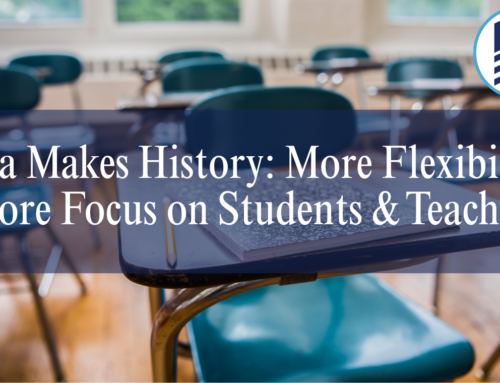
Let’s take a stroll through history together. We’ll start in the Colonial years and visit with Noah Webster. Then, we’ll wind our way through the formative eras of Horace Mann and later John Dewey, examining their influence on American education. Our final destination is today’s robust parental-rights movement.
We’ll explore the story of how American education shifted from a Judeo-Christian foundation to a more secular, state-driven model, and how today’s parents have sounded the battle cry to reclaim influence, culture, and education—and why that matters.
Noah Webster: Education as Moral Bedrock
Noah Webster is widely known as the Father of America’s Scholarship and Education. Webster was an education reformer who believed that citizens in the various states should have the opportunity to learn and acquire a similar knowledge base, creating a competitive advantage for all.
In the early 1800s, Webster wasn’t just compiling dictionaries; he saw language, education, and morality as inseparable. His famous Blue Back Speller was a foundational tool in American education for generations, and it leaned heavily on Scriptural principles intertwined with phonics and other fundamental concepts.
Webster emphasized that instruction must serve virtue and character, which is directly rooted in his Judeo-Christian worldview. He believed schooling should reinforce moral foundations, not merely convey knowledge.
Horace Mann: Broadening Reach, Toning Down Doctrine
A few decades after Noah Webster, Horace Mann entered the scene. Known as the “father of American education,” Mann championed universal, taxpayer-funded common schools that taught morality without advancing sectarian doctrine.
His vision was that education could act as the great equalizer: lifting children out of poverty and preparing them for the responsibilities of citizenship.
However, Mann’s schools differed from the overtly Christian classrooms of Webster’s era. He argued that public schools shouldn’t function as “theological seminaries.” Instead, they should teach the Bible in a general way and emphasize Christian morals with a more passive approach. In his words, the Bible should be allowed “to speak for itself,” offering moral lessons without doctrinal debates.
This was a step back from the historical precedent of teaching Biblical principles to the youth. Mann’s approach left young Americans stumbling blindly into Biblical principles without the direct instruction that Webster believed was so vital.
Thus began the slow erosion of Christian influence and morality in the area of education. Where Webster tied learning directly to Christian belief, Mann’s model softened that emphasis to unify a diverse and growing population.
Horace Mann viewed public schools as a means to “tame” individual selfish impulses and nurture reason and conscience, without a deliberate and proactive Judeo-Christian objective.
John Dewey: Progressive Pedagogy and the Decline of Moral Certainty
Now, let’s wander to the early 20th century and discover John Dewey. This stage of our stroll takes us into the realm of progressive, experiential learning.
Dewey, the pragmatist philosopher behind the learning-by-doing approach, reimagined schools as places to explore, experiment, and engage, rather than merely memorize facts. In textbooks like Democracy and Education, he challenged the notion of teaching fixed, canonical morals, instead favoring flexible, child-centered learning.
Many critics argue that Dewey dismantled the transmission of traditional moral values, seeing religion and inherited beliefs as obstacles to progress. Some even describe his approach as a “humanistic religion,” where schools socialize students into collectivist ideals rather than cosmological truths.
Put simply: Dewey shifted the educational compass from moral certainty to pragmatic experimentation, and from transmitting virtue to fostering adaptive citizenship. Moral relativism was his guiding compass, one he incorporated into his educational model.
The Tug-of-War: Moral Instruction vs. Secular Progressivism
Common school curricula in Mann’s era featured texts like the McGuffey Readers, which were rich in spiritual and moral lessons, even if overt religious doctrine had receded. Yet today, we’ve seen a steep decline in even soft acknowledgment of Judeo-Christian values in education.
The downward spiral has continued. By the mid-20th century, courts, such as Engel v. Vitale and Abington v. Schempp, struck down school-led prayer and Bible reading, further pressuring public schools into doctrinal neutrality.
Today, character education can be traced back to colonial moral teachings, such as the New England Primer, which directly integrated Christian principles into early literacy lessons. Yet, the more progressive agenda seeks to overlook character training in general, focusing instead on programs that promote DEI initiatives or social-emotional learning.
This tug-of-war, between overt moral instruction and secular neutrality, has shaped every wave of education reform for more than two centuries.
Today’s Parental Rights Movement: Reclaiming Moral Agency
Now, let’s leap to the present. Parents and rights advocates are emerging as champions of a more values-aligned approach to education. Communities and individuals alike are unifying to reclaim education and reform the disaster it has become.
Over the last few years, concerned parents have pushed back against progressive and damaging curricula, especially on race, sexuality, and gender topics. Parental rights and moral concerns are fueling this determined charge against progressive amoralism. Recent headlines reflect tangible gains: a U.S. Supreme Court ruling has affirmed parents’ rights to withdraw their children from instruction that conflicts with their religious beliefs, praising it as a victory for parental authority and religious liberty. As this fight has evolved, its impact has triggered a series of laws and policies that have incrementally begun to roll back progressivism.
A Vision for the Future: Restoring Moral Balance
So where does that leave us, as parents, citizens, and concerned citizens? To achieve success, we need defined goals and a clear vision:
- Value Transparency: Encourage schools to be explicit about moral underpinnings and proactive about teaching foundational moral principles.
- Parental Empowerment: Support parents in voicing their expectations through school board participation, curriculum feedback, and oversight of educational materials.
- Civic Harmony: Promote shared moral teachings, like honesty, civic duty, compassion, without negating religious sensibilities.
An Uphill Battle
The story of American education is, at its core, a story of shifting foundations. Noah Webster believed that schools should instill in children a foundation in virtue, morality, and faith. Horace Mann widened access to education, but in doing so, he diluted that Christian influence in favor of civic unity. John Dewey took it further, remaking schools into laboratories for progressive ideas and moral relativism rather than institutions that pass down enduring truths.
Today, parents across the country see the results of that drift. When schools prioritize ideology over teaching essential subjects like reading, math, history, and moral responsibility, families must take a stand.
The modern parental rights movement isn’t a fringe reaction. It’s a return to the American tradition that Webster envisioned, where education is inseparable from moral character and family authority.
If America is to remain free, schools cannot be neutral about virtue. They must once again prepare students to be responsible citizens, grounded in truth, morality, and respect for God and country. America’s youth must be educated and ready to counter objectionable ideologies and policies, based on a solid moral foundation and a clear understanding of what’s at stake.
Reclaiming education is not just about policy; it’s about preserving the cultural and moral inheritance that has guided this nation from the beginning.
Learn more about reclaiming education and culture by downloading our new e-book Reclaiming Edcuation and Culture




